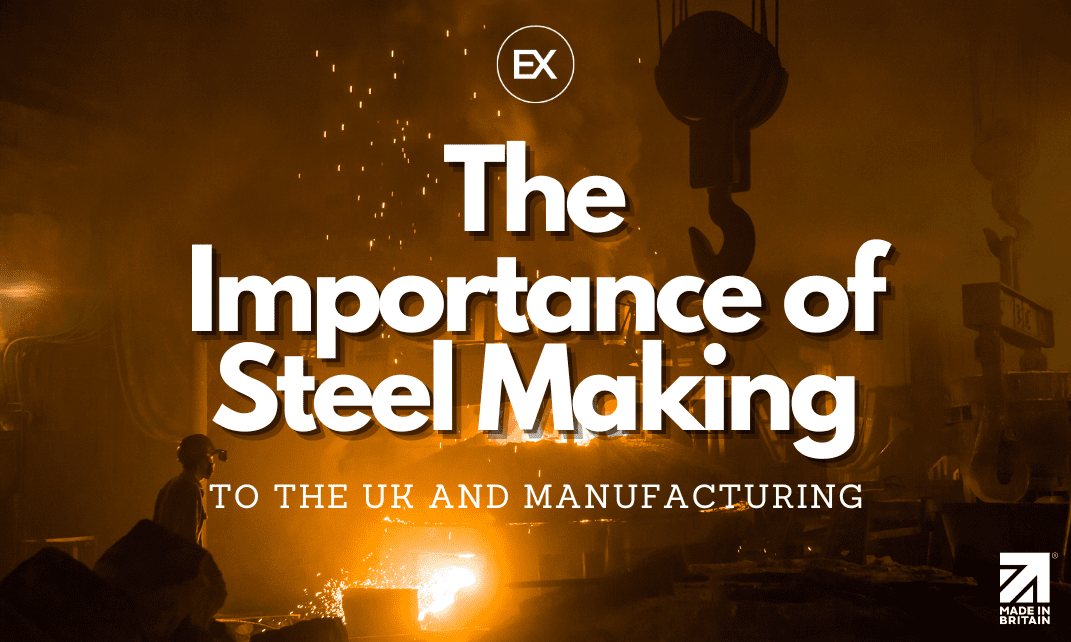The Importance of Steel Making to the UK and Manufacturing

Curtis Bligh
- 4 Min Read
Over the weekend, we read reports from The Guardian, about how Port Talbot continues its battle to keep its steelmaking tradition alive. For more than a century, Port Talbot has played an important role in UK steelmaking employing more than 4,000 people in a town numbering 32,000. The steaming Chimney stacks have shaped not just the skyline, but the history, economics and culture of the local community.
This could soon change however, as Tata announced plans for producing greener steel resulting in a four-year shutdown in Wales. Unions argue this could cost 2,500 jobs directly and hundreds more in the wider community. Unite, Britian’s biggest trade Union, are about to present HM Government with a £12bn plan that is says can ensure a renaissance.
But why is this happening, and how important is steelmaking to the UK economy? We will address these questions below!
The importance of Steel Making to the UK Economy and Decarbonisation
The Steel making industry plays an important role in the UK’s economy and is a key contributor to UK Manufacturing. It is fundamental to the UK’s industrial strategy in supporting economic growth. The industrial strategy aims to boost productivity by backing businesses to create jobs and increase earning power of people throughout the UK. This includes investment in skills, industries and infrastructure.
Steel Making, based on the latest data from the House of Commons Library, contributed £2.4 billion to UK GDP in 2021. This is the equivalent of 0.1% of the UK’s total economic output and 1.2% of manufacturing output. As of 2019, UK Steel making supported 33,400 jobs, the equivalent of 0.1% of all UK jobs.
The industry is central to the UK’s decarbonisation goals. This is done, not through deindustrialisation, but by taking responsibility for the emissions of our steel consumption. At present, the UK has been presented with the opportunity to be the first globally to decarbonise with the right parameters in place.
To do this, a number of key policy options are available for the UK government to drive greener steelmaking. According to the Centre for Research into Energy Demand Solutions (CREDS), this includes lowering industrial electricity prices. In addition, it is recommended that Government remove discrepancies between the cost of greenhouse gas emissions for steelmakers by implementing a carbon border adjustment mechanism.
As of this moment, steps are already being taken towards decarbonisation within industry. This includes the announced plans of Liberty Steel in 2021 to build the world’s first large-scale zero-carbon steel plant in the UK. By 2030, they have announced plans to become carbon neutral.
The Role of Metal Spinners in Manufacturing
The metal spinning industry plays a vital role in a variety of industries, including aerospace, automotive, and medical. In these industries, metal spinners create everything from small, intricate parts to large, structural components.
One example of the importance of metal spinners can be seen in the aerospace industry. In this industry, weight is a critical factor, as every ounce saved can lead to significant fuel savings. Metal spinners play a crucial role in creating lightweight, high-strength parts that can withstand the rigors of flight.
Similarly, in the automotive industry, metal spinners are responsible for creating a wide range of parts, including wheels, fuel tanks, and exhaust systems. The precision and attention to detail required in metal spinning ensures that these parts meet the stringent safety and performance standards of the automotive industry.
The medical industry also relies heavily on the skills of metal spinners. In this industry, metal spinners create a wide range of products, including surgical instruments, implantable devices, and diagnostic equipment. The precision and cleanliness required in the production of these products make metal spinning an essential part of the manufacturing process.
The Key events of UK Steel Making since 2019
The UK steelmaking industry hasn’t had a smooth journey however, especially over the last five years. Let’s take a look at some major events that have unfolded;
- The BBC reported in 2021 that the UK was “left behind” after the US agreed to end a trade war over items including steel imports from the EU. The agreement didn’t cover exports from the UK, putting British steelmakers at a disadvantage. The tariffs that came into force in 2018, nearly halved British steel exports to the US. In 2022, a quota system was introduced for Steel and Aluminium exporters in the UK. This meant that tariffs no longer had to be paid for specific volumes of Steel and aluminium per year.
- In May 2019, The Guardian reported that British steel entered insolvency after the government refused to provide it with a £30m loan, saying the terms the company and its private equity owner, Greybull Capital, were asking for amounted to unlawful state aid. ITV News reported in November that year, that Chinese buyers, Jingye Group, purchased the Scunthorpe plant for £70 million. 4,000 jobs were saved as a result. However, in recent months British Steel announced a £1.25bn proposal to replace furnaces with two electric arc furnaces as reported by the BBC. Concerns have been raised that the move could results in between 1,500 and 2,000 job losses, predominantly in Scunthorpe.
- In June 2022, The Telegraph reported that the British steel Industry was further hampered as the Nuclear and Defence industry were heavily reliant on imported steel. Of the £150m spent on Steel in 2022, only £45m came from British makers.
- In March 2023, The Guardian reported on the government’s failure to support the UK steel industry in their budget. Trade Union expressed their disappointment in the government’s failure to tackle serious threats to the sector. Although £600m injected within industry to keeps the UK’s last four steel blast furnaces going was welcomed it fell short compared to France and Germany. These countries are currently offering “billions of pounds” for their own steelmakers. Tougher measures are also being called upon to ensure more domestically produced steel was used in UK infrastructure as well as action on tackling profiteering energy firms.
These events showcases how damaging a lack of support from Government, and the failure to implement key policies has been for UK steelmaking. Let’s take a look at the top five challenges UK steelmakers are facing.
Five Challenges UK Steelmakers are facing in 2024
- Punishing energy Costs – High energy costs are making it difficult for UK steelmakers to compete with foreign imports.
- Competition from Foreign imports – UK steelmakers are facing stiff competition from foreign Imports
- Decarbonisation – The expensive challenge of decarbonisation is a serious threat to the UK steel industry
- Lost Markets and Lower demand – UK steelmakers are losing markets and facing lower demand
- Open market access for imported steel – UK steelmakers are facing open market access for imported steel
According to a BBC report, UK steelmaking is a whisker away from total collapse due to crippling energy costs, carbon taxes and more. The government’s failure to support the ailing UK steel industry in the budget for example, has now put thousands of jobs at risk.
Why is Tata Steel about to cut jobs?
Britain’s largest steel maker recently announced plans to decarbonise its steel making processes. This would involved closing Port Talbot’s two blast furnaces, which use coal replacing them with an electric alternative. This is due to growing pressure to move to greener, less carbon-intensive forms of steel making. Presently, Tata’s site in Port Talbot is the single largest emitter of CO2 in the UK.
However, with the current challenges UK steelmaking faces, Tata admitted that their UK operations are losing over £1 million per day. HM Government have offered £500 million of taxpayer support as part of an agreement struck in September to help with the transition. But, now it has been announced up to 3,000 jobs are at risk.
This announcement comes as 2,000 jobs are also at risk at British Steel, despite having been rescued by Chinese firm Jingye who promised a ‘new chapter’ for British steelmaking.
The planned electric arc furnaces offer the ability to recycle scrap steel using clean electricity. Currently, coking coal is heavily relied upon, which emits large amounts of carbon into the atmosphere. However, with all four of the UK’s blast furnaces shutdown, the UK would be the only major economy in Europe and G20 with no ability to make steel from scratch. Instead relying on imported steel for the aerospace and automotive sectors.
Is there an alternative solution to Tata’s planned job cuts?
Unite believe the eco-friendly switch can be made without jobs cuts or closing the furnaces down altogether. Proposals would see government spend £12 billion over 12 years to boost a steel renaissance, which would pay itself in 10 years via tax receipts. A 40% subsidy has also been proposed as part of plans to tackle crippling energy costs UK steelmaking currently faces.
Currently, British manufacturers pay 86% more for their energy than competitors in Germany and 62% more than in France. A move to Greener steel would see increased electricity usage. Unite argue that industry must be prioritised for upgraded connections to the grid.
A “Buy British” clause is also being proposed by Unite. Financial incentives to encourage the purchase of UK-made steel is one recommendation put forward. Government have announced plans for a carbon tax on imported steel from 2027, but there are many who want to bring this in sooner. Unite argue that these proposals could double the UK steel output.
Since 1971, UK steel output has fallen from 25m tonnes to 6m tonnes. This decline has seen jobs fall from more than 250,000 to less than 34,400.
Conclusion
It is evident that more needs to be done from government level to support UK steel and UK manufacturing. Failure to act has resulted in thousands of jobs losses since the 70s, and this has had a profound effect on local communities.
It is criminal the lack of support for UK manufacturing, as imported steel has been favoured over UK made steels. How manufacturers in the UK face crippling energy costs with little to no support from Government, whist our Europeans counterparts pay less in energy costs.
It is not just direct employment that suffers from a lack of support or policies. Local economies are detrimentally impacted. From Cafes and Pubs, to suppliers, contractors and local shops. Entire communities are at risk and a failure to act now could see the end of UK steel making as we know it.
How has it been allowed to come to this?
Related Articles

Boosting British Manufacturing: A £360 Million Investment
Boosting British Manufacturing: A £360 Million Investment Facebook Twitter LinkedIn WhatsApp Email It’s been declared ahead of the Budget that Chancellor Jeremy Hunt will announce

Design Considerations for Metal Spinning Success: Part One
There are many design considerations businesses should considers to get the most out of their metal spinning supply. Read Part One here

The Importance of Innovation in UK Manufacturing
Manufacturing plays a pivotal role within the UK, shaping society and innovating like no other. It is the most productive sector in the UK

